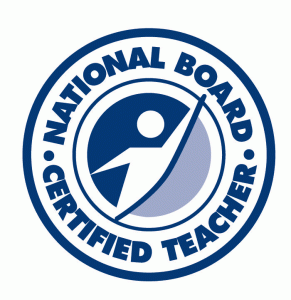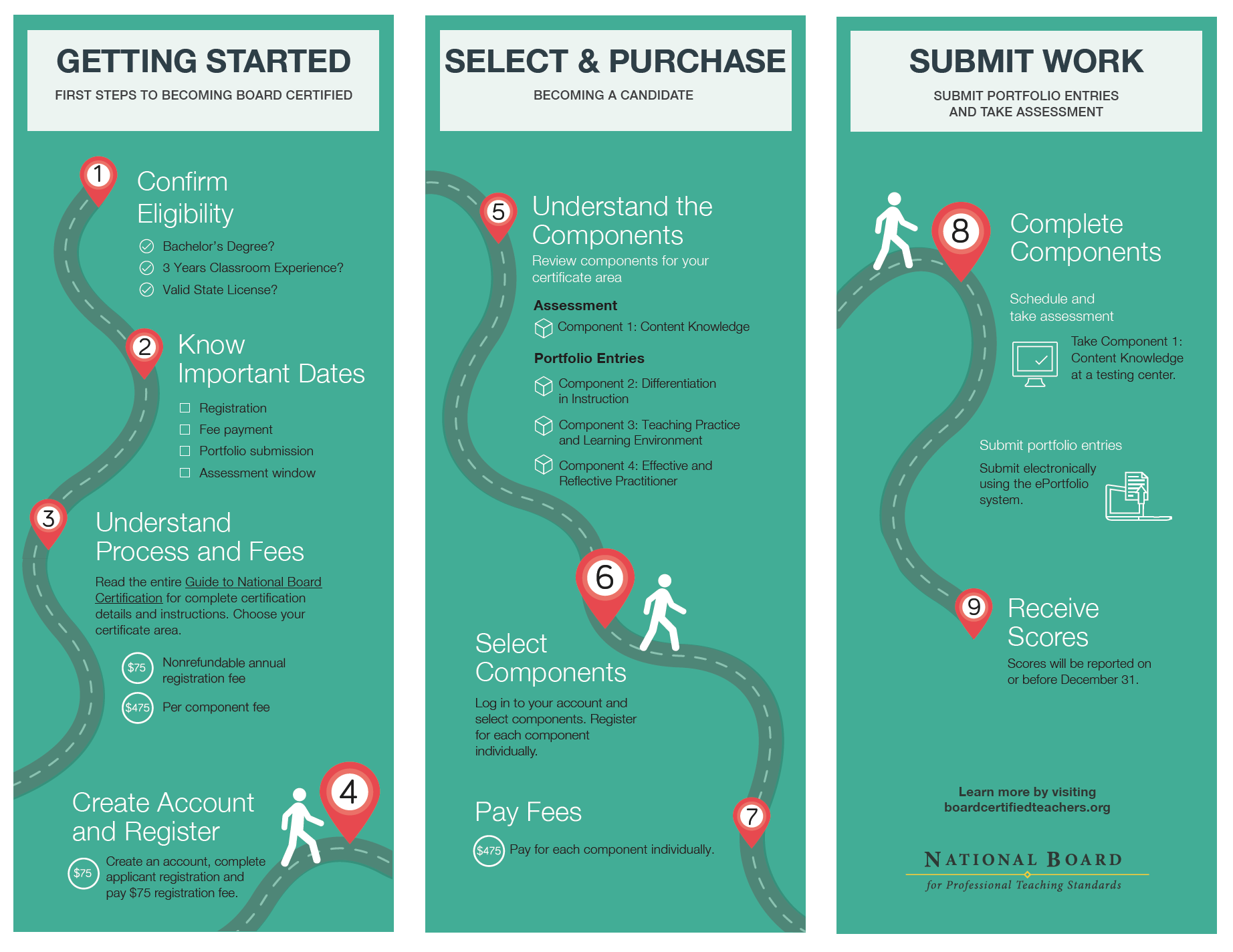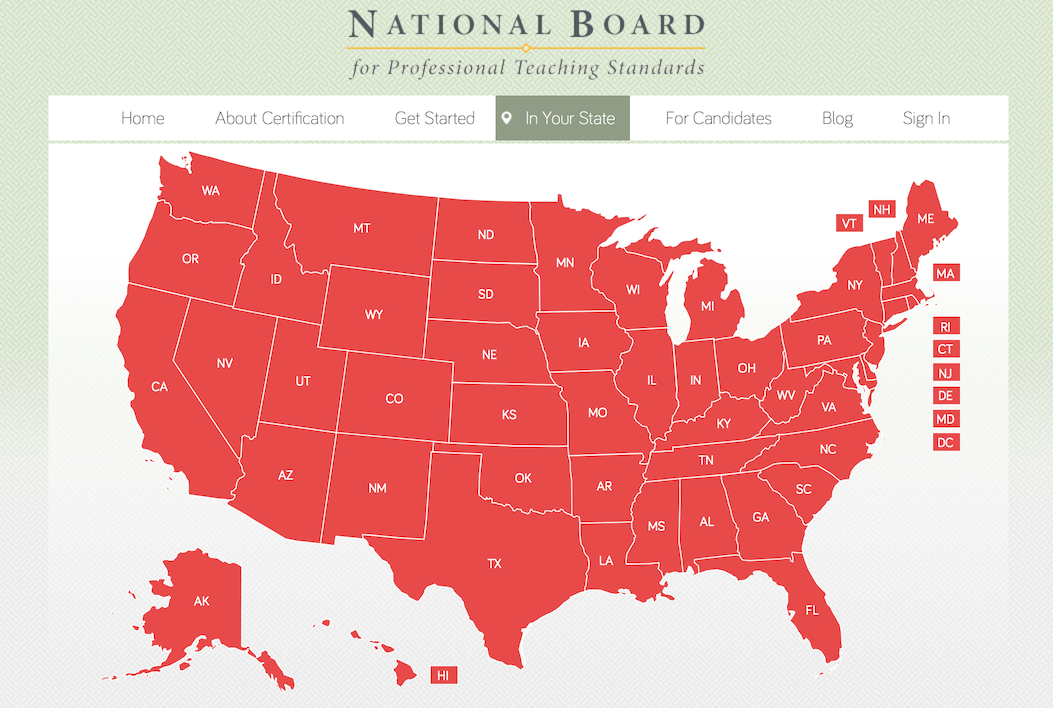Why Becoming an NBCT May Be Right for You
 By Amber Rain Chandler
By Amber Rain Chandler
Sleep deprivation can make you do crazy things. There’s the run-of-the-mill putting the hummus in the cabinet, cell phone in the fridge, kind of thing—which happens to all of us (I think, right?) from time to time after a long week.
Then, there’s the impact of longer sleep deprivation. Why else would I sign up to pursue National Board Certification with a cranky four month old and a toddler, when I had just returned to school from my maternity leave?
Late night emailing can be a bad side effect of sleep deprivation. Mine went like this:
1) Read email for “National Board Certification Awareness Session.”
2) Google “National Board Certification.” Think that it looks awesome to become an “accomplished teacher.” Rumored, but not confirmed, that fewer than half pass on their first try.
3) Hit reply.
4) Type “I’ll be there.” Wonder what am I getting myself into? Less than half?!
So, it was as simple as that
I was lucky enough to stumble upon the best professional development, hands down, of my entire career. The process of pursuing National Board Certification, now eight years ago, set something in motion that has forever changed the way I feel about teaching, learning, and my role as a teacher.
 What, you might wonder, could possibly be so special about becoming an NBCT? Trust me, you aren’t the only one doubting “just another thing” to do. Through the years, I’ve heard all kinds of reasons not to bother or excuses about why it’s just not a good time.
What, you might wonder, could possibly be so special about becoming an NBCT? Trust me, you aren’t the only one doubting “just another thing” to do. Through the years, I’ve heard all kinds of reasons not to bother or excuses about why it’s just not a good time.
You don’t know me, but I’m going to tell you something about yourself right now. If you weren’t interested, just a teeny tiny bit, you wouldn’t be reading this right now.
Now that we both know that you are just a teeny tiny bit interested, let me talk you into something that will change your life. It’s not often that a perfect stranger can say that, right?
Here are the top three things that might be holding you back (and my reasons you should ignore them):
“I don’t have time”
We are all busy. Some people are just busy being busy, while some people are genuinely barely keeping all the balls in the air. It doesn’t matter which you are—and I’ve been both before—because pursuing certification can become the entire focus of your life, or you can space out how you complete the components.
There are four components, three of which are portfolio entries submitted online, and another is a computer-based assessment, taken at a local testing center. If you decide to move slowly, you can work on one component, bank your score, and move on to the next component. If you don’t pass the component, you’ll receive feedback and be able to retake for $125 (instead of the $475 it costs for each component). Which leads me to the next reason you might say you can’t take it.
“Why would I spend more money? I haven’t even paid off my student loans yet.”
This one was certainly my first concern, as I just couldn’t justify spending more money on my education. However, I quickly discovered the really good news that there are several ways to fund your candidate fees. As a New Yorker, I was able to apply for the Albert Shanker Grant, which very nearly funded my entire experience. The National Board website has an excellent map which lists the incentives provided by the state or local districts, as well as lists of support centers.
An important consideration is the impact the incentives may have in your overall salary over the course of your career. For example, Kentucky has a $2000 pay increase for the duration of your certification (you must renew every 10 years). When you consider teaching careers that easily span 25 or 30 years, the benefits are obvious.
Additionally, many universities offer graduate credit, and some schools have substantial pay increases depending on number of credits. When teachers understand that they are investing in themselves, with real, tangible financial benefits, it gives peace of mind about the initial investment.
There’s also the intangible benefit of being an NBCT. I can personally attest that I have been hired for consulting work, chosen to do panel review committees, worked on state assessments, been assigned writing opportunities, and received fellowships based, at least in part, on those four letters.
That’s the great thing about achieving (what NBCTs say instead of passing). There is an immediate respect for what you have accomplished that can open doors for you to teacher leadership. Not only do others see you differently, but you see yourself differently as well.
“But, I’m already a good teacher. I don’t need anyone to tell me that.”
I’m not going to sugar coat this: if you feel this way, you probably wouldn’t be successful in your candidacy anyway, so you might be right to skip this one.
Here’s the thing: if you are content being a good teacher and don’t need the external recognition, this is not for you. If you want to be a great teacher, a teacher who will do whatever it takes to improve all the time, then this is an experience for you. If you are a teacher who knows that the profession will always be flawed, but you love it anyway, then you will make a great candidate.
As more than 100,000 NBCTs can tell us, there’s a certain hunger that is required to put in the grueling hours of thinking, self-reflection, and documentation of things that are really hard to prove—student engagement, critical thinking, and incremental growth, to name a few.
 Maybe that’s just it. The NBCTs I know all share some common traits, despite our different content areas and personalities. We are not content with good, and we know that great will always be around the corner, a goal to work towards, but with the understanding that there is always so much more to learn. We go above and beyond what other people would expect, because when it comes down to it, we want to be accomplished leaders in our fields.
Maybe that’s just it. The NBCTs I know all share some common traits, despite our different content areas and personalities. We are not content with good, and we know that great will always be around the corner, a goal to work towards, but with the understanding that there is always so much more to learn. We go above and beyond what other people would expect, because when it comes down to it, we want to be accomplished leaders in our fields.
The National Board has great information if you are still a teeny tiny bit interested. Maybe you’re even excited that you have found your tribe of dorky teachers who like to meet on Saturdays and do more than is required, who are happy analyzing data and geeking out on Twitter chats.
We are the ones who raise our hands, say “yes” too much, and take the newbies under our wings. The greatest part about being an NBCT is that when you see those letters after someone’s name, you have a shared experience, and in all likelihood you will have a common outlook.
Listen to Twitter
As I was preparing for this blog, I asked the Twittersphere (where I converse with most of the NBCTs I know, as my own school district only has two), “What’s the best reason to pursue certification?” Rob Marsh, a newer teacher in a low income school replied, “self-reflective teachers! U get better or U get worse. We improve teaching from the inside or they ‘improve us’ from outside!”
![]() Another NBCT, Kathy Ferrell from Missouri, a retired middle school science teacher, replied, “For me, best PD possible, improved my teaching more than anything I ever did.” Amanda Zullo, who is also a New York Educator Voice Fellow with me as well as a Hope Street Group National Fellow, explained: “Fight complacency. Self-directed, self-focused professional development. Insight from reflection.”
Another NBCT, Kathy Ferrell from Missouri, a retired middle school science teacher, replied, “For me, best PD possible, improved my teaching more than anything I ever did.” Amanda Zullo, who is also a New York Educator Voice Fellow with me as well as a Hope Street Group National Fellow, explained: “Fight complacency. Self-directed, self-focused professional development. Insight from reflection.”
Keeping in mind that we’re dealing with 140 characters, you can still infer the common themes.
Get more information
If this sounds like your next step in growing as an educator, visit the National Board’s dedicated website for more information. Learn about the research behind the certificate. Or, if you are looking for a more personal approach, you can reach me via my website, doyoudifferentiate.com, or find me on Twitter @MsAmberChandler.
But don’t take my word for it. You can ask Rob (@Robcat17), Kathy (@katjferrel), or Amanda (@Chemteach201), and I know they’ll tell you the same: Don’t let this opportunity pass you by.
_________________________
Amber Chandler is a National Board Certified Middle School ELA teacher and author of The Flexible ELA Classroom: Tools for Differentiation 4-8, out in September 2016. She is a regular contributor to MiddleWeb, ShareMyLesson, GettingSmart, and AMLE Magazine. Amber’s workshops on Differentiation, Danielson’s Domains, and Project Based Learning are all designed to create a student-centered classroom. Follow her on Twitter @MsAmberChandler and check out her website doyoudifferentiate.com for teaching resources.
Feature Image Credit: National Board




































